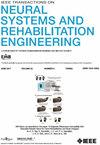Enhanced Online Continuous Brain-Control by Deep Learning-Based EEG Decoding
IF 5.2
2区 医学
Q2 ENGINEERING, BIOMEDICAL
IEEE Transactions on Neural Systems and Rehabilitation Engineering
Pub Date : 2025-07-21
DOI:10.1109/TNSRE.2025.3591254
引用次数: 0
Abstract
Objective: A growing amount of deep learning models for motor imagery (MI) decoding from electroencephalogram (EEG) have demonstrated their superiority over traditional machine learning approaches in offline dataset analysis. However, current online MI-based brain-computer interfaces (BCIs) still predominantly adopt machine learning decoders while falling short of high BCI performance. Yet, the generalization and advantages of deep learning-based EEG decoding in realistic BCI systems remain far unclear. Methods: We conduct a randomized and cross-session online MI-BCI study on 2D center-out tasks in 15 BCI-naive subjects. A newly proposed deep learning model named interactive frequency convolutional neural network (IFNet) is leveraged and rigorously compared with the prevailing benchmark namely filter-bank common spatial pattern (FBCSP) for online MI decoding. Results: Through extensive online analysis, the deep learning decoder consistently outperforms the classical counterpart across various performance metrics. In particular, IFNet significantly improves the average online task accuracy by 20% and 27% in two sessions compared with FBCSP, respectively. Moreover, a significant cross-session training effect is observed by the IFNet model (基于深度学习的脑电信号解码增强在线连续脑控制。
目的:越来越多的深度学习模型用于从脑电图(EEG)解码运动图像(MI),已经证明它们在离线数据集分析中优于传统的机器学习方法。然而,目前基于mi的在线脑机接口(BCI)仍然主要采用机器学习解码器,而缺乏高BCI性能。然而,基于深度学习的脑电解码在现实脑机接口系统中的推广和优势尚不清楚。方法:我们对15名bci初始受试者进行了一项随机、交叉时段的在线MI-BCI研究,并进行了2D中心-输出任务。本文利用一种名为交互频率卷积神经网络(IFNet)的新提出的深度学习模型,并与主流基准即滤波器组公共空间模式(FBCSP)进行了严格的比较,用于在线MI解码。结果:通过广泛的在线分析,深度学习解码器在各种性能指标上始终优于经典解码器。特别是,与FBCSP相比,IFNet在两个会话中的平均在线任务准确率分别显著提高了20%和27%。此外,IFNet模型观察到显著的交叉训练效果(P = 0.017),而对照方法没有观察到显著的交叉训练效果(P = 0.337)。进一步的离线评估也证明了IFNet优于最先进的深度学习模型。此外,我们还提出了独特的行为和神经生理学见解,以支持在线脑机交互。结论:我们提出了使用深度学习的在线mi -BCI的首批研究之一,在连续BCI控制中实现了显着增强的在线性能。意义:本研究提示深度学习在mi - bci中的良好应用,对脑卒中康复等临床应用具有重要意义。
本文章由计算机程序翻译,如有差异,请以英文原文为准。
求助全文
约1分钟内获得全文
求助全文
来源期刊
CiteScore
8.60
自引率
8.20%
发文量
479
审稿时长
6-12 weeks
期刊介绍:
Rehabilitative and neural aspects of biomedical engineering, including functional electrical stimulation, acoustic dynamics, human performance measurement and analysis, nerve stimulation, electromyography, motor control and stimulation; and hardware and software applications for rehabilitation engineering and assistive devices.

 求助内容:
求助内容: 应助结果提醒方式:
应助结果提醒方式:


